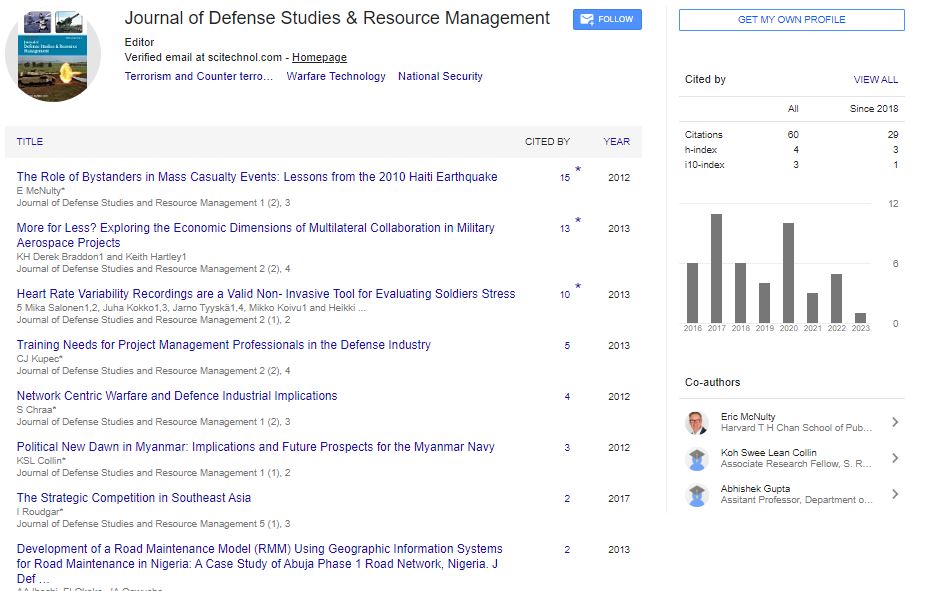Opinion Article, J Def Stud Resour Manage Vol: 11 Issue: 1
The Impact of Cybersecurity on Defense Resource Management
Yu-Qin-Liu*
Department of Information Science and Technology, Yanshan University, Hebei, China
*Corresponding Author: Yu-Qin-liu
Department of Information Science and
Technology, Yanshan University, Hebei, China
E-mail: yuliu@qin.126.com
Received date: 01 March, 2023, Manuscript No. JDSRM-23-93370;
Editor assigned date: 03 March, 2023, Pre QC No. JDSRM-23-93370(PQ);
Reviewed date: 17 March, 2023, QC No. JDSRM-23-93370;
Revised date: 24 March, 2023, Manuscript No. JDSRM-23-93370(R);
Published date: 31 March, 2023, DOI: 10.4172/2324-9315.1000162
Citation: Liu YQ (2023) The Impact of Cybersecurity on Defense Resource Management. J Plant Physiol Pathol 11:2.
Description
The rise of cyber threats and attacks is an issue that has gained increasing importance in the defense sector in recent years. The increasing dependence on digital technology in defense operations has made the sector more vulnerable to cyber-attacks, which can have a significant impact on defense resource management. This article will discuss the impact of cybersecurity on defense resource management, with a focus on the challenges faced by the defense sector in mitigating cyber risks and the measures that can be taken to improve cybersecurity in defense operations.
Cybersecurity has become an important aspect of defense resource management as it affects various areas, including information security, supply chain management, and infrastructure protection. A cyberattack on a defense system can result in the loss or compromise of sensitive information, disruption of infrastructure, and damage to equipment and resources. This can have significant consequences on the ability of the defense sector to carry out its operations effectively.
One of the most significant impacts of cybersecurity on defense resource management is the need to allocate resources to manage cyber risks. The defense sector needs to invest in cybersecurity measures to protect its networks, data, and infrastructure from cyber threats. This requires a significant allocation of resources, including funding, personnel, and technology. As such, cybersecurity has become a consideration in defense budgeting and resource allocation.
Another impact of cybersecurity on defense resource management is the need to adopt new approaches to supply chain management. The defense sector is highly reliant on a global supply chain, which makes it vulnerable to cyber-attacks on its suppliers. Cyber-attacks on suppliers can result in the compromise of defense systems, which can have severe consequences for the defense sector. As such, there is a need to adopt new approaches to supply chain management that consider cybersecurity risks.
One of the challenges in mitigating cyber risks in defense operations is the evolving nature of cyber threats. Cyber threats are constantly evolving, and attackers are becoming more sophisticated in their methods. This makes it difficult for the defense sector to keep up with the changing threat landscape and implement effective cybersecurity measures.
Another challenge is the shortage of cybersecurity professionals in the defense sector. The demand for cybersecurity professionals has increased significantly in recent years, but there is a shortage of skilled personnel to fill these roles. This makes it challenging for the defense sector to implement effective cybersecurity measures and manage cyber risks effectively.
To improve cybersecurity in defense operations, there is a need to adopt a comprehensive approach that considers all aspects of cybersecurity. This includes investing in technology, personnel training, and supply chain management.
One measure that can be taken to improve cybersecurity is the adoption of a risk management approach. The defense sector needs to identify and prioritize its assets and allocate resources accordingly. This involves conducting regular risk assessments to identify potential cyber threats and vulnerabilities and implementing measures to mitigate these risks.
Another measure is to improve personnel training in cybersecurity. The defense sector needs to invest in training programs to develop the skills of its personnel in managing cyber risks. This includes training in identifying and responding to cyber threats, as well as developing cybersecurity policies and procedures.
Cybersecurity has become an important consideration in defense resource management. Cyber threats can have significant consequences on the ability of the defense sector to carry out its operations effectively. To mitigate these risks, there is a need to adopt a comprehensive approach that considers all aspects of cybersecurity. This involves investing in technology, personnel training, and supply chain management. By implementing effective cybersecurity measures, the defense sector can protect its assets and carry out its operations effectively in an increasingly digital world.
 Spanish
Spanish  Chinese
Chinese  Russian
Russian  German
German  French
French  Japanese
Japanese  Portuguese
Portuguese  Hindi
Hindi 